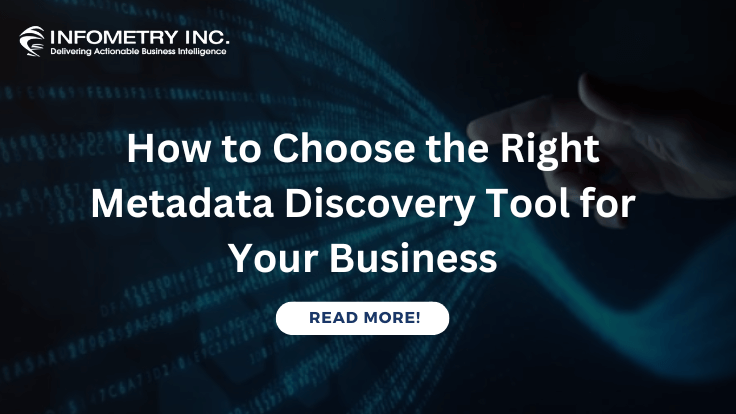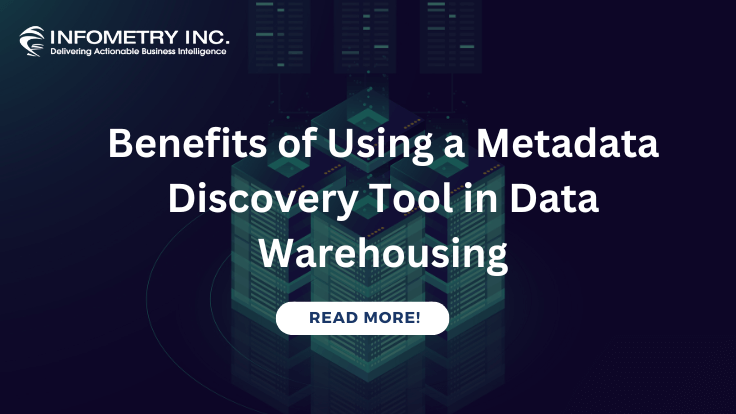
Snowflake Transition: Accelerating Performance in Data Analytics
April 26, 2024
Choosing the Right Analytics Tool: Qlik, Tableau, Power BI Compared
May 6, 2024In the digital age, data is the lifeblood of businesses. From customer insights to operational efficiency, organizations rely on data to make informed decisions and drive innovation. However, as data volumes continue to explode and the complexity of data ecosystems grows, managing and orchestrating data across various cloud platforms becomes increasingly challenging. This is where cloud data orchestration comes into play.
In this comprehensive guide, we’ll delve into the intricacies of cloud data orchestration, exploring its importance, key components, best practices, and how Infometry can help businesses master this critical aspect of modern data management.
Understanding Cloud Data Orchestration
Cloud data orchestration integrates, harmonises, and automates data workflows across multiple cloud environments. It involves seamlessly moving data between different systems, applications, and services while ensuring data quality, security, and governance.
At its core, cloud data orchestration aims to streamline data pipelines, enabling organizations to efficiently collect, transform, store, and analyze data at scale. By orchestrating data workflows, businesses can accelerate time-to-insight, enhance decision-making, and unlock the full potential of their data assets.
Key Components of Cloud Data Orchestration
Data Integration: This involves connecting disparate data sources, such as databases, applications, APIs, and IoT devices, to aggregate data for analysis. Integration tools facilitate the seamless movement of data across various platforms, ensuring compatibility and consistency.
Data Transformation: Data often needs to be cleansed, standardized, and enriched before it can be used for analytics or other purposes. Data transformation tools enable organizations to manipulate data structures, apply business rules, and derive valuable insights from raw datasets.
Workflow Automation: Automating data workflows reduces manual intervention, minimizes errors, and improves efficiency. Workflow automation tools enable organizations to schedule, trigger, and monitor data processing tasks, ensuring timely and accurate delivery of data to end-users.
Orchestration Engine: The orchestration engine serves as the command centre for managing data pipelines. It coordinates the execution of various tasks, monitors workflow progress, handles exceptions, and provides visibility into the entire data orchestration process.
Best Practices for Cloud Data Orchestration
Define Clear Objectives: Clearly define the goals and objectives of your data orchestration initiatives to align them with business priorities and outcomes.
Choose the Right Tools: Selecting the appropriate data integration, transformation, and orchestration tools is crucial for achieving success. Evaluate tools based on scalability, flexibility, ease of use, and compatibility with your existing infrastructure.
Ensure Data Quality: Prioritize data quality by implementing data validation, cleansing, and enrichment processes. Establish data governance policies to maintain consistency, accuracy, and compliance across your data ecosystem.
Embrace Modular Architecture: Adopt a modular architecture that allows for flexibility and scalability. Break down complex workflows into smaller, reusable components for easier management and maintenance.
Monitor and Optimize Performance: Continuously monitor the performance of your data orchestration processes and identify bottlenecks or inefficiencies. Optimize workflows to improve throughput, reduce latency, and enhance overall system performance.
How Infometry Can Help?
Infometry is a leading provider of data management and analytics solutions, specializing in cloud data orchestration. With a comprehensive suite of products and services, Infometry empowers organizations to unlock the full potential of their data assets and drive business value.
Data Integration Platform: Infometry’s data integration platform enables seamless connectivity across various data sources, including on-premises systems, cloud applications, and IoT devices. Its intuitive interface and advanced features simplify the integration process, allowing organizations to accelerate time-to-insight.
Data Transformation Services: Infometry offers data transformation services to help organizations cleanse, standardize, and enrich their data for analytics and decision-making. Leveraging industry-leading tools and technologies, Infometry transforms raw data into actionable insights, enabling organizations to derive maximum value from their data assets.
Workflow Orchestration Engine: Infometry’s workflow orchestration engine provides a centralized platform for managing and automating data workflows. With built-in scheduling, monitoring, and exception-handling capabilities, organizations can streamline data processing tasks and ensure the timely delivery of data to end-users.
Consulting and Support: Infometry’s team of experts provides consulting and support services to help organizations design, implement, and optimize their cloud data orchestration initiatives. From architecture design to performance tuning, Infometry partners with organizations every step of the way to ensure success.
Conclusion
In today’s data-driven world, mastering cloud data orchestration is essential for organizations looking to stay competitive and agile. By seamlessly integrating, transforming, and automating data workflows across cloud environments, businesses can unlock the full potential of their data assets and drive innovation.
With Infometry’s comprehensive suite of products and services, organisations can overcome the challenges of cloud data orchestration and harness the power of their data to achieve their business objectives. From data integration to workflow orchestration, Infometry provides the tools, expertise, and support needed to succeed in the era of big data.
In summary, cloud data orchestration is not just a technology initiative; it’s a strategic imperative for organizations looking to thrive in the digital age. By embracing best practices and leveraging the right tools and technologies, businesses can unleash the full potential of their data and gain a competitive edge in today’s fast-paced market landscape.




